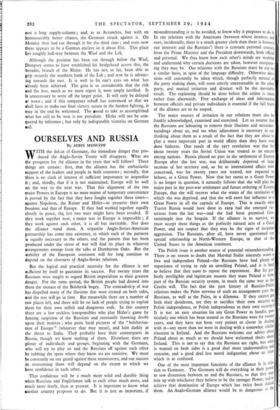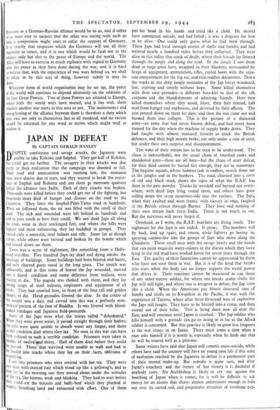OURSELVES AND RUSSIA
By JOHN MOSCOW
WITH the defeat of Germany, the immediate danger that pro- duced the Anglo-Soviet Treaty will disappear. What are the prospects for the alliance in the years that will follow? Three things are certain: first, that the alliance has the enthusiastic support of the leaders and people in both countries ; secondly, that there is no clash of interest of sufficient importance to jeopardise it ; and, thirdly, that if it is not maintained, Europe will be well on the way to the next war. That this alignment of ;he two major Powers in Europe is no mere matter of temporary convenience is proved by the fact that they have fought together three times— against Napoleon, the Kaiser and Hitler—to preserve their own freedom and that of Europe. If they had worked together equally closely in peace, the, last two wars might have been avoided. If they work together now, a major war in Europe is impossible ; if they work against each other, it is all but inevitable. Nor does the alliance stand alone. A tripartite Anglo-Soviet-American partnership has come into existence, in which each of the partners is equally necessary to the others, and the pattern that has been produced under the stress of war will find its place in whatever arrangements emerge from the talks at Dumbarton Oaks. But the stability of the European continent will for long continue to depend on the closeness of Anglo-Soviet relations.
But the logical and practical necessity for the alliance is not st.fficient by itself to guarantee its success. For twenty years the Russians were taught to regard British imperialism as their greatest danger. For the same period, the British people had dinned into them the menace of the Bolshevik bogey. The comradeship of war has dispelled many of the illusions that were created on both sides, and the rest will go in time. But meanwhile there are a number of raw places left, and there will be no lack of people trying to exploit them for their own selfish and dangerous ends. In this country there are a few reckless irresponsibles who play Hitler's game by fanning suspicion of the Russians and constantly throwing doubt upon their motives ; who paint lurid pictures of the " bolshevisa- tion of Europe " (whatever that may mean), and hint darkly at the threat to India. Thek probably have their counterparts in Russia, though we know nothing of them. Elsewhere there are plenty of individuals and groups, beginning with the Germans, who will try to play us and the Russians off against each other by rubbing the 'spots where they know we are sensitive. We must be constantly on our guard against these manoeuvres, and our success in overcoming them will depend on the extent to which we have confidence in each other.
That confidence will be a much more solid and durable thing when Russians and Englishmen talk to each other much more, and much more freely, than at present. It is important to know what another country proposes to do. But it is just as important. if misunderstanding is to be avoided, to know why it proposes to do it In onr relations with the Americans (between whose interests and ours, incidentally, there is a much greater clash than there is between
our interests and the Russians') there is constant personal contact, from the Prime Minister and the President downwards, both official and personal. We thus know how each other's minds are working and understand why certain decisions are taken, however exasperat- ing they may be. Our relations with the Russians must be put on a similar basis, in spite of the language difficulty. Otherwise deci- sions will constantly be taken which, though perfectly natural to the party making them, will seem utterly unreasonable to the other party, and mutual irritation and distrust will be the inevitable result. The explaining should be done before the action is taken rather than afterwards. Free exchange of ideas and information between officials and private individuals is essential if the full fruits of the alliance are to be reaped.
The major sources of irritation in our relations must also be frankly acknowledged, examined and exorcised. Let us assume that the Russians are labouring to remove their illusions and misunder- standings about us, and see what adjustment is necessary in our thinking about them as a result of the fact that they are about to play a more important part in world affairs than they have ever done hitherto. One result of the 1917 revolution was that for about twenty years the Soviet Union was treated as an outcast among nations. Russia played no part in the settlement of Eastern
Europe after the last war, was deliberately deprived of large sections of her territory and, so far as international affairs were
concerned, was for twenty years not treated, nor expected to behave, as a Great Power. Now that her status as a Great Power is no longer in question, it naturally follows that she will play the major part in the post-war settlement and future ordering of Eastern Europe, that she will recover what she wants of the territories of which she was deprived, and that she will exert her influence as a Great Power in all the capitals of Europe. This is exactly what Tsarist Russia would have done in 1919 had she emerged vic- torious from the last war—and she had been promised Con- stantinople -into the bargain. If the alliance is to survive, we must accept these things as the perfectly natural acts of a Great Power, and not suspect that they may be the signs of incipient aggression. The Russians, after all, have never questioned our special relationship to North-Western Europe, or that of the United States to the American continent.
The Polish issue is another source of potential misunderstanding. There is no reason to doubt that Marshal Stalin sincerely wants a free and independent Poland—the Russians have had plenty of experience of trying to rule an unwilling Poland, and it is hard to believe that they want to repeat the experiment. But for per- fectly intelligible and legitimate reasons they want Poland to form part of the Russian security system, in much the same way as the Czechs will. The fact that the past history of Russian-Polish
relations makes the Poles nervous of such an arrangement puts the Russians, as well as the Poles, in a dilemma. If they cannot get both their desiderata, are they to sacrifice 'their own security to Polish independence, or Polish independence to their own security?
It is not an easy situation for any Great Power to handle, par- ticularly one which has been treated as the Russians were for twenty years, and they have not been very patient or clever in dealing with it—any more than we were in dealing with a somewhat similar situation in Ireland. And the Russians welcome our advice about Poland about as much as we should have welcomed theirs about Ireland. This is not to say that the Russians are right, but what is wanted on both sides is a good deal more understanding and restraint, and a good deal- less moral indignation about an issue which is so confused.
One of the most important functions of the alliance is in rela- tion to Germany. The Germans will do everything in their power to sow dissension between us and the Russians, so that they 1113 join up with whichever they believe to be the stronger Power, and so achieve that domination of Europe which has twice been denied them. An Anglo-German alliance would be as dangerous to the Russians as a German-Russian alliance would be to us, and if either of us were ever to suspect that the other was toying with such an idea, a competition might start to enlist the support of Germany. It is exactly that suspicion which the Germans will use all their ingenuity to create, and it is one which would be fatal not to the alliance only but also to the peace of Europe and the world. The Allies will have to exercise as much vigilance with regard to Germany after the peace as they have done during the war, and it is hard to believe that, with the experience of two wars behinsl us, we shall be taken in by this sort of thing, however subtly it may be
done.
Whatever form of world organisation may be set up, the peace of the world will continue to depend ultimately on the relations of the four Great Powers. Two of those Powers are situated in Europe, where both the world wars have started, and it lies with them whether another war starts in this area or not. The maintenance and strengthening of the alliance between them is therefore a duty which they owe not only to themselves but to all mankind, and no excuse should be tolerated for any word or action which might tend to weaken it.



























 Previous page
Previous page